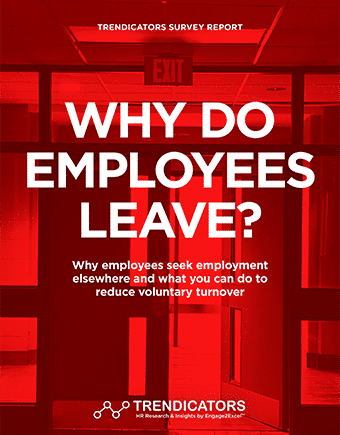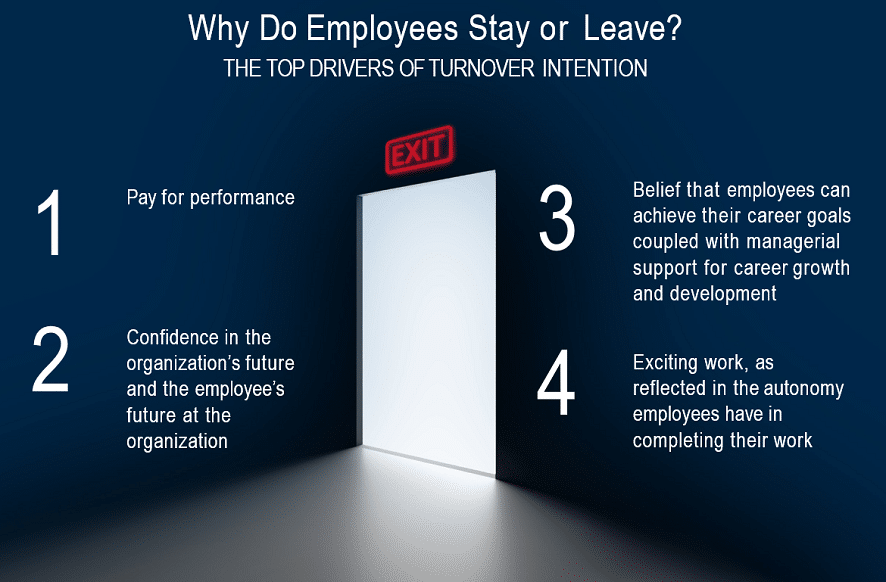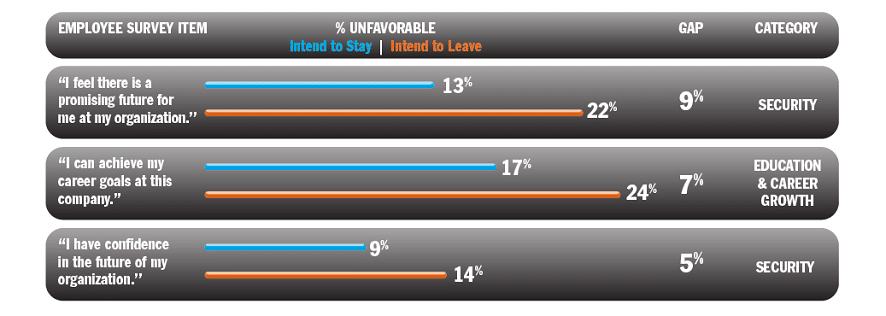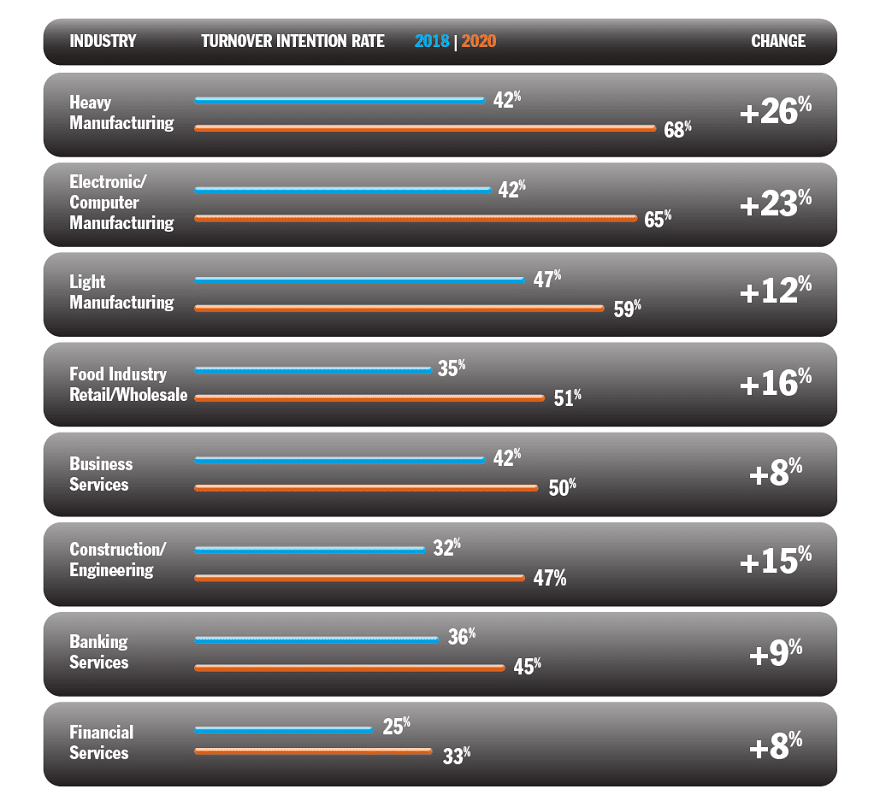Why Do Employees Leave?

In search of a brighter future, 46% of American workers are “seriously thinking about leaving their organizations within the next 12 months.”
THIS REPORT EXPLORES:
- Top drivers that influence turnover intent
- Turnover-intention levels by generation
- The industry sectors at greatest risk
- Ideas for updating your retention strategy
Download
 hbspt.cta.load(123973, '3bef95b4-ed4e-473f-834d-c020ddde1bf9', {});
hbspt.cta.load(123973, '3bef95b4-ed4e-473f-834d-c020ddde1bf9', {});
What’s Changed?
In a world increasingly preoccupied with data, analysts prioritize actionable information by asking two simple questions: 1) What has changed, and 2) where have the most statistically significant changes occurred?
Why do employees leave? Employee turnover is an even bigger topic in 2020, due to record low unemployment, than it was in 2018 when we produced the first edition of this report. Retaining employees has become one of the highest priorities for CEOs and HR leaders today. In many sectors, employee retention is now a critical factor in determining and maintaining a competitive advantage.
Two years ago, when we first conducted our survey on why employees leave, unemployment was down, and the economy was improving. In that survey, we found significant gaps between employees who intended to stay and those who intended to leave.
Pay for Performance: When we asked employees if they felt their pay was directly related to how well they perform, 69% of those who intended to stay in 2018 answered favorably, compared with 37% of employees who were “seriously thinking about leaving within the next 12 months.” The level of dissatisfaction over pay dropped to 27% in our 2020 survey, indicating that perceptions of compensation levels have improved.
Generational Differences: Compared with 2018, we found two changes in turnover intention within generational groups. The percentage of Millennials thinking about leaving dropped from 58% in 2018 to 50% in 2020, while the percentage of Gen Xers thinking about leaving increased an equivalent amount, from 40% to 48% this year.
Sectors at Risk: The most significant and actionable finding in comparing differences in survey data over the last two years is a double-digit increase in turnover intention within five industry sectors. You’ll also discover five sectors where 50% or more of employees are seriously considering leaving within the next 12 months.
The findings presented in this report address four key questions:
- What are the top drivers of employee turnover in 2018?
- What are the greatest differences between employees who intend to stay and leave?
- How do turnover-intention levels differ between generations?
- Which industry sectors face the highest and lowest turnover risk in 2018?
Survey Demographics:
Number of Respondents: 5,000
Countries Represented: United States
Industries Represented: All major industries
Respondent Demographics: U.S. adult workers in all job types, with proportionate representation of gender, age group and racial/ethnic origin
Margin of Error: 95% confidence level +/- 1.5%
The Bigger Picture: Shrewd analysts know that reading between the lines of trends can reveal a bigger picture. We summarize the top drivers for turnover intention, you’ll learn about the four most significant drivers for turnover intention. After fair compensation, workers want to feel confident in their organization’s future and their own future at the organization. They want to believe they can achieve their career goals with managerial support. And they want exciting work, along with autonomy in completing that work.
The Big Takeaway: In a nutshell, retaining employees in 2020 and beyond is all about the future. To build individuals’ confidence in their future with your organization, you’ll need to create more meaningful, relevant and achievable career experiences. Recommendations for helping managers and leaders accomplish these goals are provided in the last section of this report.
Trendicators is the research division of Engage2Excel, a leading provider of employee recognition, engagement survey and talent acquisition solutions. Trendicators provides original research, along with reports on insights and best practices from industry leaders and experts.
Download
 hbspt.cta.load(123973, '3bef95b4-ed4e-473f-834d-c020ddde1bf9', {});
hbspt.cta.load(123973, '3bef95b4-ed4e-473f-834d-c020ddde1bf9', {});
Recognition has evolved.
Retaining employees in 2020 is all about creating better career experiences.
For more than a decade, HR professionals have read that low levels of employee engagement are closely associated with a lack of recognition. Many service providers seized on this opportunity to offer employee recognition programs. Offering “thanks for a job well done” was an easily automatable task for software-as-a-service platforms. These widely implemented programs have had a positive influence on employee engagement levels and will continue to do so, given that recognition is a key driver of engagement.
In our 2018 survey, recognition played a role in influencing turnover intention levels. But, according to our 2020 survey results, managers and organizations overall have gotten better at treating employees with dignity and respect and providing praise for good work. In 2020, basic recognition was not a significant factor in driving turnover intent. Recognition has evolved. The top three drivers for turnover intention haven’t changed in the past two years. Employees today want fair and equitable compensation. They want to have confidence in their organization’s future and their role in it, and they want to believe they can achieve their career goals with support from their manager.
Of elevated importance this year is that employees want exciting work and greater autonomy in performing that work. It’s no longer enough to be thanked for a job well done. Employees today need to feel confident about their future, and they want more meaningful, relevant and achievable career experiences. Delivering these experiences requires rethinking engagement strategies throughout the employment life cycle and providing training for managers, who have the greatest influence over turnover intention.

Download
 hbspt.cta.load(123973, '3bef95b4-ed4e-473f-834d-c020ddde1bf9', {});
hbspt.cta.load(123973, '3bef95b4-ed4e-473f-834d-c020ddde1bf9', {});
Key differences between those intending to stay vs. leave in 2020
While differences in the percentage of favorable results emerged on two of the three listed items, the differences (while statistically significant) are not large in an “absolute” sense. Indeed, the much larger and more practically significant differences are evidenced in the percentage of unfavorable results, which show an average difference of about seven percentage points between the two groups. This is consistent with turnover intent logic; namely, the more unfavorable the experience for employees, the more likely they are to intend to leave. These results suggest that turnover intent is driven very significantly by employees’ confidence in the future of the organization and their own future with the organization.

How do turnover intention levels differ between generations?
Turnover intentions have been analyzed according to generational groups (Boomers, Generation X and Millennials). Of the three groups, Millennials are most seriously considering leaving their organization in the next 12 months, an attitude regularly displayed by those who are at an earlier stage in their career.

Download
 hbspt.cta.load(123973, '3bef95b4-ed4e-473f-834d-c020ddde1bf9', {});
hbspt.cta.load(123973, '3bef95b4-ed4e-473f-834d-c020ddde1bf9', {});
Which industry sectors are at greatest risk of voluntary turnover?
Manufacturing sectors, as shown below, are at the greatest risk of turnover, along with the food industry, with double-digit increases in turnover intention levels. More than half of all employees surveyed in these sectors indicated that they were seriously thinking about leaving their organization within the next 12 months. Low unemployment, skills shortages and a growing economy have created conditions in which employees in these sectors, as well as in construction, engineering, business, banking and financial services, have more choices and an increased propensity to consider employment elsewhere.

Download
 hbspt.cta.load(123973, '3bef95b4-ed4e-473f-834d-c020ddde1bf9', {});
hbspt.cta.load(123973, '3bef95b4-ed4e-473f-834d-c020ddde1bf9', {});
What can managers and company leaders do to improve employee retention?
Depending on your industry, the percentage of employees who are seriously considering leaving in the next 12 months ranges from 29% to 68%. This percentage is highest (50%) among Millennials. The following are practical recommendations for what you can do to address the perceptions with the greatest influence on employees who intend to leave.
PAY: “My pay is directly related to how well I perform.”
Find out what fair pay means: Ask what your employee is expecting in terms of pay and what he/she believes constitutes fair pay. This one-to-one discussion will help clear up misconceptions.
Understand what rewards your employee values: Tailor rewards to employee preferences. Remember that consistent recognition and praise can be a great alternative to monetary rewards.
Link pay and rewards to performance: Employees should easily be able to see how their effort and performance are related to their rewards. Linking pay to performance gives employees a greater sense of responsibility, job ownership and control over their pay and rewards.
SECURITY:“I feel there is a promising future for me at my organization.”
Investigate what employees want from their jobs: Frequently talk with employees and discuss what they want regarding long-term employment and career development. Discussing the future with employees can help instill in them a sense of security and confidence in the organization.
Become acquainted with employees: Get to know your employees on a personal level. Ask about their hobbies outside of work or other personal preferences. Showing interest in your employees’ personal lives demonstrates that you are committed to them.
Inform employees of current and future opportunities: If an organization’s managers and leaders make it clear that gaining skills and experience is likely to result in continued employment, employees are likely to behave in ways that lead to positive outcomes. Because of this, it is important to make employees aware of opportunities that may help them gain worthwhile skills.
Download
 hbspt.cta.load(123973, '3bef95b4-ed4e-473f-834d-c020ddde1bf9', {});
hbspt.cta.load(123973, '3bef95b4-ed4e-473f-834d-c020ddde1bf9', {});
RECOMMENDATIONS
EDUCATION & CAREER GROWTH: “My manager has made a personal investment in my growth and development.”
Make a personal investment: Employees want to feel that you are personally invested in them. Sit down and create an individualized development plan.
Offer flexible opportunities: Ensure that engaging in career development opportunities doesn’t leave your employees feeling overwhelmed. Consider less time-restricted opportunities, such as mentoring, job shadowing and mobile learning.
Tailor training and development opportunities: Each employee has different knowledge, skills and abilities; therefore, a one-size-fits-all approach won’t work.
EDUCATION & CAREER GROWTH: “I can achieve my career goals at this company.”
Ask employees what they need: Regularly soliciting ideas for the development of your employees can help you understand what they want and give you new ideas. There are two useful questions to ask your employees: 1) What skills are you looking to develop? and 2) How can I help you grow?
Incorporate growth opportunities into the strategic plan: Opportunities for training and development should be considered in both the organization’s and the department’s strategic plans.
Incorporating these opportunities sets the stage for the budgetary and time considerations needed to provide effective training opportunities.
EXCITING WORK: “I have the freedom to decide how to do my work.”
Ensure person-job fit: It is essential to strike a balance between the challenge of a task and the skills and abilities of the employee performing the task. Person-job fit should be stressed early on during the selection process through assessments or work samples.
Increase autonomy: Give your employees the power to shape their work environment in ways that allow them to perform their best. Clear boundaries should be set to hold employees accountable, but they should also have freedom to be creative in how they complete their work.
Provide skill variety: Seek out opportunities for your employees so that the tasks and responsibilities of their jobs require a range of skills. Involving new opportunities will keep the job enjoyable and challenging.
SECURITY: “I have confidence in the future of my organization.”
Create a timeline of future goals: Senior management should make company-wide goals known to all employees. Managers should then work with their employees to review the company’s goals and create individual goals. Setting these concrete company, departmental and individual goals can help give employees a clear sense of the future and the company’s health, and show they are needed for the foreseeable future.
Ensure employees know they are important: Senior leaders should demonstrate that employees are essential to the success of the organization. This can be accomplished by allowing open dialogue and valuing each employee’s concerns, ideas and/or feedback. When employees are encouraged to voice their opinions and be proactive, they feel involved in company-wide decisions and valued as employees.
Download
 hbspt.cta.load(123973, '3bef95b4-ed4e-473f-834d-c020ddde1bf9', {});
hbspt.cta.load(123973, '3bef95b4-ed4e-473f-834d-c020ddde1bf9', {});